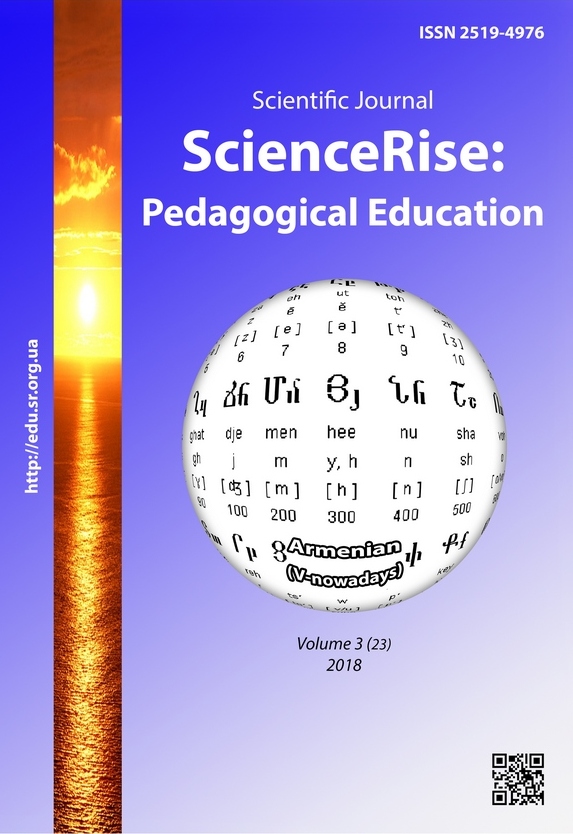Professional and pedagogical training of future English- and Chinese-language translators in Ukraine’s universities
DOI:
https://doi.org/10.15587/2519-4984.2018.126004Keywords:
readiness, training, professional training, preparedness, translator of the English and Chinese languagesAbstract
The article is devoted to the problem of professional and pedagogical training targeted to the future translators of English and Chinese in Ukraine’s universities.
The author’s interpretation of the terms “readiness”, “training”, “professional training”, “preparedness” is represented in the paper. The term “training” covers these constituents: a stock of knowledge, skills, experience acquired in the process of training, practical activities. “Students’ readiness for translation activity” is considered as a set of interrelated personal and functional properties of the subject (a student ‒ future translator of the Chinese and English languages), necessary for the effective implementation of professional translation activities in accordance with regulatory requirements, put forward by the end of professional training. A complex model structuring the readiness of the future Chinese- and English-languages translator (taking into account the qualification specifics) for professional (translation- and pedagogy-oriented) activities is described in the research; the designated model includes a set of motivational and evaluative qualities of an individual, his / her professional and pedagogical knowledge and skills, skills and experience required for successful translation activity in the professional environment and pedagogical activity under conditions of the person- and competence-oriented approaches to students’ training and up-bringing.
The components of the future English- and Chinese-languages translator’s readiness for translation activities are specified: linguistic-motivational, communicative-informational, operational and activity-centred.
The vector of professional training targeted to the future translators of English and Chinese in the context of diplomatic relations between China and Ukraine is seen as a perspective of further research
References
- Akademichnyy tlumachnyy slovnyk ukrayins'koyi movy v 11 tomakh [Academic explanatory dictionary of the Ukrainian language in 11 volumes] (1970–1980). Vol. 1‒4. Kyiv: Naukova dumka.
- Platonov, K. K. (1962). Voprosy psihologii truda [Issues on Psychology of Labour]. Moscow: Medgiz, 218.
- Levitov, N. D. (1963). Psihologiya truda [Psychology of Labour]. Moscow: Uchpedgiz, 340.
- Puni, A. Ts. (1993). Psihologicheskaya podgotovka k sorevnovaniyu v sporte [Psychological training in sport competing]. Moscow, 274.
- Uznadze, D. N. (1966). Psihologicheskie issledovaniya [Psychological Research]. Moscow: Nauka, 452.
- Alatortsev, V. A. (1969). Gotovnost sportsmenov k sorevnovaniyam: opyt psihologicheskogo issledovsniya [Sportsmen’s readiness for competitions: experience of psychological research]. Moscow: Fizkultura i sport, 31.
- D'yachenko, M. I., Kandybovich, L. A. (1998). Kratkiy psikhologicheskiy slovar': Lichnost', obrazovanie, samoobrazovanie, professiya [Brief Psychological Dictionary: Personality, Education, Self-Education, Profession]. Minsk: Helton, 399.
- Nersesyan, L. S., Pushkin, V. N. (1969). Psihologicheskaya struktura gotovnosti operatora k ehkstremal'nym deistviyam [Psychological structure of operator’s readiness for extreme actions]. Voprosy psihologii [Psychological Issues], 5, 24‒31.
- Lezhnina, L. V. (2009). Gotovnost psikhologa k professionalnoy deyatelnosti: etapy, mekhanismy, tekhnologii formirovaniya [Psychologist’s readiness for professional activity: stages, mechanisms, formation technologies]. Moscow, 47.
- Samoilik, A. V. (2003). Formirovanie psihologicheskoi gotovnosti sotrudnikov organov vnutrennih del k professional'noi deyatel'nosti v usloviyah presecheniya prestuplenii terroristicheskogo haraktera [Formation of psychological readiness of law-enforcement bodies employees’ for professional activity under conditions of suppression of crimes having a terrorist nature]. Tver, 210.
- Durai-Novakova, K. M. (1983). Formirovanie professional'noi gotovnosti studentov k pedagogicheskoi deyatel'nosti [Formation of students’ professional readiness for pedagogical activity]. Moscow, 72.
- Korablina, E. P. (1990). Stanovlenie gotovnosti k inzhenernoi deyatel'nosti u studentov tekhnicheskogo vuza [Readiness development of technical university students for engineering activity]. Leningrad, 21.
- Sosnovskii, B. A. (1992). Motivacionno-smyslovye obrazovaniya v psihologicheskoi strukture lichnosti [Motivation and sense formation in the psychological structure of personality]. Moscow, 30.
- Korobkova, V. V. (1999). Formirovanie gotovnosti podrostkov k razvitiyu svoego tvorcheskogo potenciala v processe prepodavaniya kursa «Mir i Chelovek» [Formation of adolescents’ readiness to develop their creative potential while conducting the course “World and Human being”]. Perm: PGPU, 51.
- Hutorskoi, A. V. (2001). Sovremennaya didaktika [Modern Didactics]. Saint Petersburg: Piter, 544.
- Derkach, A. A. (2004). Akmeologicheskie osnovy razvitiya professional [Acmeological basis of professional development]. Moscow: Izdatel'stvo Moskovskogo psihologo-social'nogo institute; Voronezh: NPO MODEK, 752.
Downloads
Published
How to Cite
Issue
Section
License
Copyright (c) 2018 Oleksandra Popova

This work is licensed under a Creative Commons Attribution 4.0 International License.
Our journal abides by the Creative Commons CC BY copyright rights and permissions for open access journals.
Authors, who are published in this journal, agree to the following conditions:
1. The authors reserve the right to authorship of the work and pass the first publication right of this work to the journal under the terms of a Creative Commons CC BY, which allows others to freely distribute the published research with the obligatory reference to the authors of the original work and the first publication of the work in this journal.
2. The authors have the right to conclude separate supplement agreements that relate to non-exclusive work distribution in the form in which it has been published by the journal (for example, to upload the work to the online storage of the journal or publish it as part of a monograph), provided that the reference to the first publication of the work in this journal is included.








